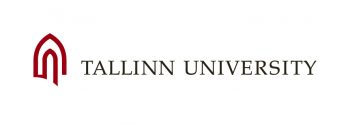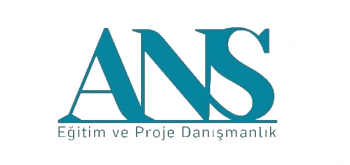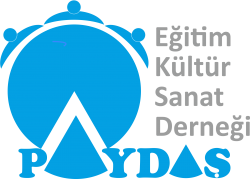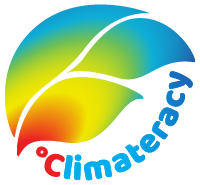
Partners

teachers

Students

Stakeholders




Climate change is one of the biggest challenges facing mankind in our time. Over the 21st century, climate scientists expect Earth’s temperature to continue increasing, very likely more than it did during the 20th century. This will affect almost every aspect of human society, including economic prosperity, human and environmental health, and national security. It’s up to all of us to build that new sustainable society. Therefore it’s mandatory that we start by making people aware of how their actions impact the Earth. Only then we can start doing things differently and create a Climate Literate Society.
Education is an essential element of the global response to climate change. It helps people understand and address the impact of global warming, increases “climate literacy” among young people, encourages changes in their attitudes and behaviour, and helps them adapt to climate change related trends. Although the role of education in addressing the challenges of climate change is increasingly recognized, the school curriculum still fails to reflect the urgency of the climate crisis.
The Erasmus+ project Climateracy aims at enhancing teachers’ profiles to coach students effectively in European secondary schools to raise the level of climate literacy by developing educational content for Climate Literacy, an Open Online Course to allow teachers to promote climate literacy at schools and an Online Teacher Community including activities developed to assist them to bring the topic of climate change into their classrooms.


Tallinn University (TLU) is the largest university of humanities in Tallinn and the third biggest public university in Estonia. Tallinn University has 6 schools, a regional college and 5 centres of excellence in which study and research is conducted in six different disciplines: educational sciences, humanities, arts, natural sciences, social sciences, and health sciences. By focusing resources and activities TLU develops five interdisciplinary research-based focus fields: educational innovation, digital and media culture, cultural competencies, healthy and sustainable lifestyle, and society and culture.
The university has committed itself to the strategic goal of becoming an international research university with a strong social conscience and an open-minded, flexible and collegial environment for academic and personal growth. It is also a university in which the considerable academic freedom guaranteed to both the schools and the students are balanced by stringent quality requirements. The main objective of the university’s research and development activities is to support the sustainable development of Estonia by using the resources of the university’s R&D activities to define acute problems and to present effective solutions.
More than 7,500 students (9.5% of them international) are enrolled in TLU’s bachelor, master and doctoral study programmes. Approximately 15,000 people also participate in further education and Open University studies each year. The university employs over 900 people, including nearly 500 researchers and lecturers. Compared to other HE institutions in Estonia, TLU has the greatest percentage of foreigners (12%) working as regular academic staff in Estonia.
A number of study programs is offered on the Bachelor’s, Master’s and Doctoral level including educational innovation and leadership, educational sciences, primary teacher education, andragogy, pedagogy, environmental management, natural sciences and ecology.
The School of Educational Sciences is responsible for coordinating the teaching, research and development activities in education. It is also responsible for the academic sustainability in the field of education both in Tallinn University and Estonia in general. All teacher training programs have a network and collaboration with a big number of schools.

Vzw UC Limburg is a Higher Education Institution in Flanders, collaborating under the name UC Leuven-Limburg with 2 other HEIs: vzw UC Leuven (formerly KHLeuven) and vzw UC Leuven Comenius Lerarenopleidingen (formerly Group T). UC Limburg is renowned for the high quality of its teaching, research & regional development.
More than 30 professional bachelor, and lifelong learning study programs are offered in various disciplines fields, with a focus on health care, social work, business & commerce, teacher education, science & technology. UC Leuven-Limburg’s strong commitment to research ensures state-of-art training programs for its 15 000 students.
Priority domains of the institution are: regional development, blended learning (including development of MOOCs and Open Data Platform), lifelong learning strategies, internationalisation & research. The research policy is focused on market-driven applied research. Central to the UC Limburg’s mission in the field of research is to develop innovative technology for companies, and to transfer new technology to the market.
UC Limburg also provides consultancy and continuing education for local industries, organisations and governments. UC Limburg is member of educational networks across the globe and strongly collaborates with local, regional and national policy-making bodies, resulting in a broad network of stakeholders.

ANS is a private consultancy body operating in the field of education, research & development and international projects. It was born in 2017 in Antalya, Turkey to create, develop and disseminate expertise, professionalism and lifelong learning at local, national and European level.
The main goal of ANS is to help Turkish and international schools, institutions and NGOs to design and coordinate their European, national and local projects. First, we do a need analysis and partner search and then we write projects. Upon wish we assist them also during the implementation of their project with various services such as trainings, finances, maintaining international contacts, translation and reporting.
ANS provides tailor made institutional development trainings for the staff, members or volunteers on a wide range of topics such as project cycle management (PCM) trainings and European Union Projects Workshop.
It also offers opportunities to improve teachers’ lives through training, transfer of innovation and lifelong learning education. ANS specializes in the field of school education, but it implements other projects within the European framework as well. For 3 years we have designed and implemented some projects concerning Nature Education, Outdoor Learning, STEAM Jobs, Anger-free Classes, Bike-friendly schools, etc. for schools, municipalities and NGOs.
ANS is a company that is committed to quality, innovation and European cooperation. We firmly believe that European cooperation including mobility, exchanges and mutual learning has strong benefits to individuals and European community.
The staff of ANS consists of trainers and educators in schools and university with significant experience in training and research projects as well as psychologists and social workers who can deliver and support counselling activities as required.
ANS is closely cooperating with Akdeniz University, Municipality of Antalya, Eastern Mediterranean Research Association, Antalya Cycling Association, other schools, entities/companies and NGOs.

The University of Gothenburg meets societal challenges with diverse knowledge. 38 000 students and 6 000 employees make the University a large and inspiring place to work and study, with a continuous flow of new knowledge and ideas. Strong research and attractive study program attract scientists and students from all around the world. The University of Gothenburg is environmentally certified and works actively for sustainable development. With new knowledge and new perspectives, the University of Gothenburg contributes to a better future.
One collaborative initiative that the university has together with Chalmers University of Technology is the Gothenburg Centre for Sustainable Development. The Centre brings together around 500 researchers and PhD students, organizes seminars and workshops, produces publications for larger dissemination of sustainability knowledge and promotes research in the field.
The Department of Pedagogical, Curricular and Professional Studies runs an online international master ́s program in education for sustainable development. Through the program, diverse groups of students with an international background enter into critical dialogue with scientific debates in the educational, social, and natural sciences, and get access to a range of analytic tools that will help them develop theoretical as well as practice-based knowledge in education for sustainable development.
The University of Gothenburg also has the largest teacher education program in Sweden training teachers at all school levels (K-12). The program got a high quality grade in the evaluation by the Swedish Higher Education Authority. There is well-established collaboration between teacher education program and the schools in the region. The collaboration involves research and practice that helps preservice teachers in gaining meaningful experiences and supports schoolteachers in their professional development. This expert knowledge and experience will contribute to designing teacher education on climate change, testing it out with teachers in schools and further develop it for broader dissemination and practice internationally.

Paydaş is a non-profit organization founded in 2014 by reunion of the teachers who has enough experience on the national and international projects at different organisations with the aim of strengthening their enthusiasm and hard work to attain the expected goals. The members are mainly the teaching staff at different types of organisations in the field education. In this respect the association's regular activities include organizing training which support the development of the teachers in certain subjects to make them gain experience in different fields. Paydas has been awarded with the Quality Label for European Solidarity Corps by Turkish National Agency with the number 937119135.
Running organizations to nurture reciprocal education between teaching staffs and educational interaction is also one of the aims of the association. Thus, it will have far reaching impacts on the young population of Turkey and all Europe. Paydaş is trying to create a youth policy which aims to compensate young people including the ones who have economic, educational, social, physical and geographical obstacles with the help of activities in the fields of education, art, music, drama, dance and other social projects.
Paydaş has a huge network that allows the organisation to be in contact with other NGOs, schools, foreign partners, stakeholders, consulting companies, educational institutions and universities, experts, public administration, etc., and it works in close cooperation with all of them, which facilitates precise knowledge of the reality and direct contact with the target group of the project.
Therefore, previous experiences give the organisation a unique insight of the practical aspects of implementing large scale co-funded projects and also provided us an extremely wide network of collaborating organizations from all over the world.
The staff has vast experience in the implementation of EU projects, with a specific focus on Erasmus + Program. They have implemented a large number of projects in many different fields and will therefore provide projects with their experience and know-how, by exploiting the methods and processes developed in these previous projects and further developing them to meet the specific needs of the specific projects and target groups.

Since 1984 Wissenschaftsladen Bonn e.V. (WilaBonn / Bonn Science Shop) dedicates its work to key social challenges: the enormous land use, energy transition, sustainable work fields, social justice, just to name a few. In order to overcome those challenges WilaBonn aims to build a bridge between Science and Society. The overall objective of enabling people to use their knowledge for a socially acceptable change of their natural and social environment aligns with the stance that only those who have understood the societal challenges and their options for action can act to make a change. Thus the education of people (both scientists and citizens) is of major importance to WilaBonn.
When appropriate WilaBonn cooperates with local universities and other research institutions, organisations, Science Shops or multiple stakeholders in Bonn as well as in Germany or on an international level to enable multidisciplinary research, dissemination of results and education.
WilaBonn is engaged for a very long time and with high intensity in strategies and affairs related to environmental labour markets and necessary qualifications, publishing a weekly information service Labour Market Environment and Natural Sciences (Informationsdienst arbeitsmarkt Umweltschutz | Naturwissenschaften, organizing job fairs, developing concepts, performing pilot studies and writing status reports and is networking in the sectors around Green Jobs, Engergy Transition, Renewable Energies. WILA Bonn coordinated the award winning project SERENA Supergreen, a serious game to give young girls orientation on professions and occupations in renewable energies.
WilaBonn has a gender balanced 35-persons staff of whom 15 to 17 work in research and project contexts. All employees are actively involved in several networks on national or international level. In 2016 WilaBonn was awarded “Place of Progress” by the North-Rhine Westphalian Minister of Research and Innovation.
WilaBonn is an active member of Netzwerk Zukunftsforschung (Future Research), GACER (Global Alliance on Community Engaged Research), APUCEN (Asian Pacific University Community Engagement Network) and is actively networking (besides being contact point for Living Knowledge) in NCCPE (National Cooperation Center for Public Engagement, UK), GUNi (Global University Network for Innovation), Canadian and US-based Community Based Research (CBR) and Knowledge Mobilisation Networks. Since 2007 the WilaBonn coordinates and runs the international contact point for Living Knowledge, the international Science Shop Network.
There was a problem reporting this post.
Please confirm you want to block this member.
You will no longer be able to:
Please allow a few minutes for this process to complete.
In Deutschland haben insgesamt 32 Lehrkräfte aus verschiedenen Fachbereichen an der Umfrage teilgenommen. Sie beschreiben das Interesse ihrer Schüler am Klimawandel und am Umgang mit dem Thema Klimawandel als gemischt. Die Analyse zeigte auch, dass 29 der 32 Lehrer neue Methoden erlernen wollen. Hinsichtlich der Erwartungen an die Klimabildung wünschen sich die befragten Lehrer weniger Pflichtfächer in ihren Lehrplänen, dafür mehr projektorientiertes Lernen.
Ihrer Meinung nach sollte das Thema Klimawandel in möglichst vielen verschiedenen Teilen des Lehrplans aller Fächer verankert werden und Raum für Projekte im Unterricht zu Themen der Anwendung von Nachhaltigkeit lassen. Die Befragten schlagen ihren Schulleitern vor, mit Institutionen zusammenzuarbeiten, die bei Fragen des Klimawandels helfen könnten. Sie halten es auch für besonders wichtig, ihren Schülern neue Handlungsmöglichkeiten aufzuzeigen und an bestehende Initiativen anzuknüpfen.
Die Bedarfsanalyse hat auch gezeigt, dass die deutschen Schüler bisher nur über ein allgemeines Wissen zum Klimawandel verfügen. Sie sind zwar interessiert, aber aufgrund der Pandemie weniger engagiert. Das Interesse steigt jedoch, je älter die Schüler sind.
Die Lehrer hingegen sind sehr an dem Thema interessiert und motiviert, es in ihren Unterricht einzubauen. Der landesweite Lehrplan ist jedoch sehr streng. So kommt es, dass die Lehrer entweder bereits konkrete Methoden anwenden, um nachhaltige Ziele zu erreichen (und daher nicht so viele Ideen, sondern mehr Zeit benötigen, um ihre “coolen Konzepte” zu erweitern), oder zwar interessiert sind, aber nicht wissen, wie sie die neuen Ansätze in ihren Unterricht integrieren sollen.
Zusammenfassend lässt sich sagen, dass in Deutschland ein unterstützendes schulisches Umfeld, persönliche Kenntnisse über die anerkannte Wissenschaft des Klimawandels und die nationale Bildungspolitik die wichtigste Rolle spielen. Auch die Unterstützung durch die Gemeinschaft und die Aufmerksamkeit der Medien sollten nicht unterschätzt werden.
